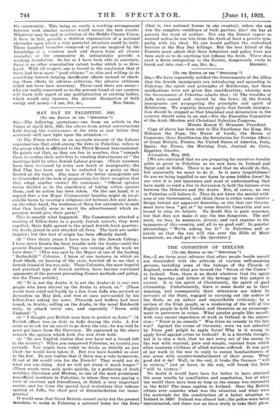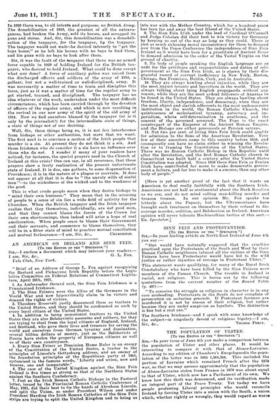THE CONDITION OF IRELAND.
[TO THE EDITOR OF THE " SPECTATOR."]
SIR,—I see from your columns that other people beside myself are dissatisfied with the attitude of various well-meaning persons, including some of the bishops of the Church of England, towards what are termed the " forces of the Crown " in Ireland. Now, there is no doubt whatever that the spirit of the speeches and letters of the bishops on this subject is correct. It is the spirit of Christianity, the spirit of good citizenship. Unfortunately, there is some doubt as to their meaning, and consequently their utterances are taken by servants of the State, engaged in carrying out the orders of the State, as an unfair and unjustifiable criticism; by a section of the Irish people, as a weakening of the will of the English people to hold Ireland, and therefore as an encourage- ment to persevere in crime. What puzzles people like myself, with very recent experience of work in Ireland, is the expres- sion : " Force is no remedy." Was force no remedy in the late war? Against the crime of Germany, were we not exhorted by Press and pulpit to apply force? Why is it wrong to apply force against crime in Ireland? It is a terrible thought, but it is also a fact, that we met every act of the enemy in the war with reprisal, pure and simple, reprisal from which often innocent civilians of allied nations.suffered. It was part of my work in the war to reply to enemy bombardments of our areas with counter-bombardment of their areas. What good did it do? Well, in the end, it broke the German " will to victory," just as force, in the end, will break the Irish
"will to victory." ' No doubt it would have been far better to hive obtained the same results by conciliation and negotiation, but of what use would these have been so long as the enemy was.successful in the field? The same applies to Ireland. Does the British citizen ever consider what was the situation and what were the materials for the construction of a better situation in Ireland in 1920? Ireland was almost lost; the police were being exterminated, and there was no force ready to take their place. In 1920 there was, to all intents and purposes, no British Army. The demobilization of 1919, the greatest of all the extrava- gances, had broken the Army, sold its horses, and scrapped its guns and stores. And, Sir, this demobilization was a demobili- zation of the taxpayer, for the taxpayer, by the taxpayer. The taxpayer would not wait—he desired intensely to "get the boys home," so he left his horses with no boys to feed them, and his guns with no boys to look after them.
Sir, it was the fault of the taxpayer that there was no armed force capable in 1920 of holding Ireland for the British tax- payer, who desired to hold Breland. What could be done except what was done? A force of auxiliary police was raised from the discharged officers and soldiers of the army of 1918, a gallant, but not a well-trained or well-disciplined, army. It was necessarily a matter of time to train and discipline this force, just as if was a matter of time for the regular army to get started, trained, and disciplined. The taxpayer has no idea whatever of the work, undertaken under the most difficult circumstances, which has been carried through by the devotion of officers of the regular army, and which is now resulting in the revival in our new army of the spirit of the old army of 1914. Now we find ourselves blamed by the taxpayer (or is it only by the journalist?) for the intermediate state of things, a state of things not of our desiring.
Well, Sir, these things being so, it is not less interference from bishops or other authorities, but more that we want. The first need is to convince a section of the Irish people that murder is a sin. At present they do not think it a sin. And those Irishmen who do consider it a sin have no influence over those who do not. I wonder if many of your readers have noticed, for instance, the special prayers used in the Church of 'Ireland at this crisis? One can say, in all reverence, that these prayers show a lively realization of the present unfortunate state of Ireland. It is due, one gathers, to some dispensation of Providence; it is in the nature of a plague or murrain. It does not appear at all that it is due to " the unruly wills of sinful men "—to the wickedness of the wicked and to the weakness of the good.
This is what crude people mean when they desire bishops to " mind their own business." They mean that in the arousing of people to a sense of sin lies a wide field of activity for the Churches. When the British taxpayer and the Irish taxpayer realize that they themselves, individually, are not good men, and that they cannot blame the forces of the Crown for their own shortcomings, then indeed will arise a hope of real amelioration. When people cease to blame their Government and their servants, and commence to blame themselves, they will be in a fitter state of mind to practice mutual conciliation
and mutual forbearance.—I am, Sir, &c., CHURCHMAN.



































 Previous page
Previous page